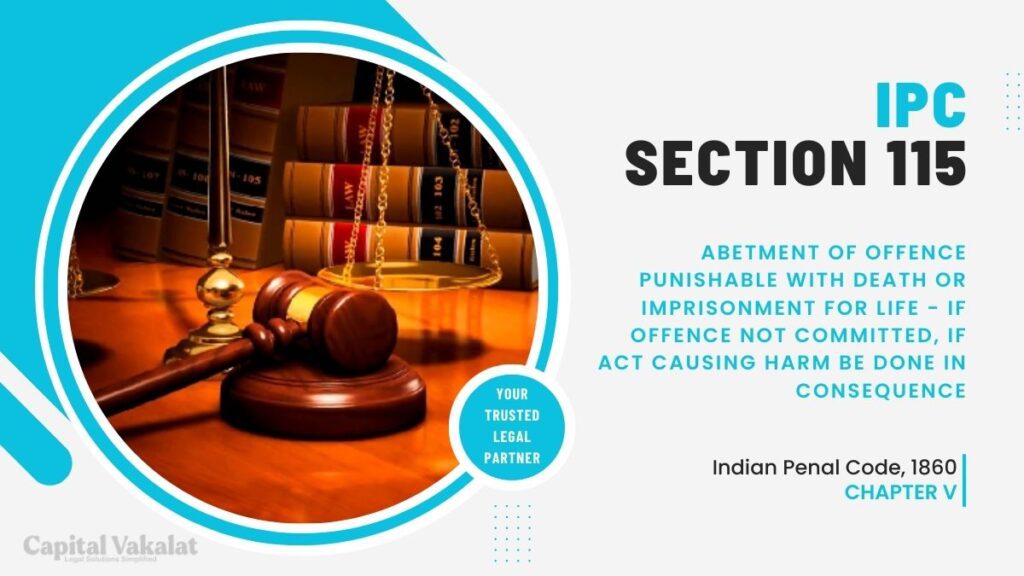In the realm of criminal law, Section 115 of the Indian Penal Code (IPC) holds significant importance. It deals with the concept of abetment and its consequences, especially when the abetted offence is punishable with death or imprisonment for life. This article delves into the intricacies of Section 115 IPC, examining the key elements and legal implications.

The Indian Penal Code, a comprehensive criminal statute, encompasses various provisions that deal with different aspects of criminal conduct and their consequences. Section 115 of the IPC addresses the issue of abetment when the abetted offence is punishable with death or imprisonment for life. Abetment, in simple terms, means aiding, instigating, or encouraging the commission of a crime. Let’s explore this in more detail.
Understanding Abetment
Abetment refers to the act of encouraging, aiding, or supporting someone in the commission of a crime. It doesn’t necessarily involve the direct perpetration of the crime but plays a crucial role in making the crime happen. The abettor may be held liable for the consequences of the crime, even if they didn’t physically commit it.
Elements of Section 115 IPC
Section 115 of the IPC outlines the essential elements that need to be satisfied for an act to be considered abetment of an offence punishable with death or imprisonment for life:
- Instigation: The abettor must instigate the commission of the offence.
- Active Participation: Encouragement alone is not enough; the abettor must actively take part in the act.
- Criminal Intent: The abettor must share a common intention with the person committing the crime.
- Abetted Offence: The crime must be one punishable with death or imprisonment for life.
Punishment for Abetment
If someone is found guilty of abetment under Section 115 IPC, they can be punished with the same punishment that is applicable to the person who actually committed the crime. This highlights the severity of abetment when the abetted offence carries the risk of death or life imprisonment.
Abetment and Its Consequences
Abetment is a serious offence that can result in severe consequences. It not only endangers the security of society but also undermines the very fabric of justice. It’s essential to understand that abettors can be prosecuted as if they had committed the crime themselves.
Cases and Precedents
To gain a deeper understanding of Section 115 IPC, it’s important to look at real-life cases and legal precedents. Several landmark cases have shaped the interpretation and application of this provision in the Indian legal system.
Legal Interpretations
The legal interpretations of Section 115 IPC have evolved over time, influenced by changing societal norms, technological advancements, and judicial decisions. It’s crucial to stay updated on these interpretations to understand how the law is applied in contemporary contexts.
Defenses against Abetment Charges
Accused individuals often have various defenses against abetment charges. These defenses can include lack of intent, lack of evidence, or alibis, among others. Understanding these defenses is critical for legal practitioners and those facing such allegations.
Role of the Accused
The role of the accused in the commission of the crime and their intent play a pivotal role in determining guilt under Section 115 IPC. A clear understanding of the accused’s involvement is crucial in legal proceedings.
Challenges in Prosecution
Prosecuting abetment cases can be challenging due to the intricacies involved. Gathering evidence of instigation and intent can be complex, and the burden of proof rests with the prosecution.
The Burden of Proof
In abetment cases, the prosecution must prove beyond a reasonable doubt that the accused actively instigated and intended to aid in the commission of a crime. This burden of proof is essential to ensure a fair trial.
Recent Amendments
Indian criminal law is not static and is subject to periodic amendments. Keeping track of recent changes is crucial for both legal professionals and the general public to understand the evolving landscape of abetment laws.
Landmark Judgments
Several landmark judgments have set legal precedents and provided valuable insights into the application of Section 115 IPC. These cases have helped clarify the nuances of abetment in India.
Abetment vs. Conspiracy
It’s important to distinguish between abetment and conspiracy, as they are often used interchangeably. Understanding the differences and similarities between these concepts is essential for a comprehensive grasp of criminal law.
Conclusion
Section 115 of the IPC deals with abetment of offences punishable with death or imprisonment for life. Abetment is a complex and multifaceted legal concept that requires a deep understanding of the law and its applications. It plays a crucial role in ensuring justice is served.
In this article, we have explored the nuances of Section 115 IPC, shedding light on its importance and the legal implications surrounding abetment in cases of offences punishable with death or imprisonment for life. Understanding these legal provisions is essential in upholding the principles of justice and ensuring a fair legal system.
FAQs
Can someone be held liable for abetment if the abetted offence is not committed?
Yes, an individual can be held liable for abetment even if the abetted offence is not ultimately committed, as long as the abetment itself is proven.
What are the potential defenses against abetment charges?
Common defenses against abetment charges include lack of intent, lack of evidence, and alibis, among others.
How has Section 115 IPC evolved over time?
Section 115 IPC has evolved through legal interpretations, amendments, and landmark judgments, which have clarified its application.
What is the punishment for abetment under Section 115 IPC?
If found guilty of abetment, the accused can be punished with the same penalty as the person who actually committed the abetted offence, which may include death or imprisonment for life.